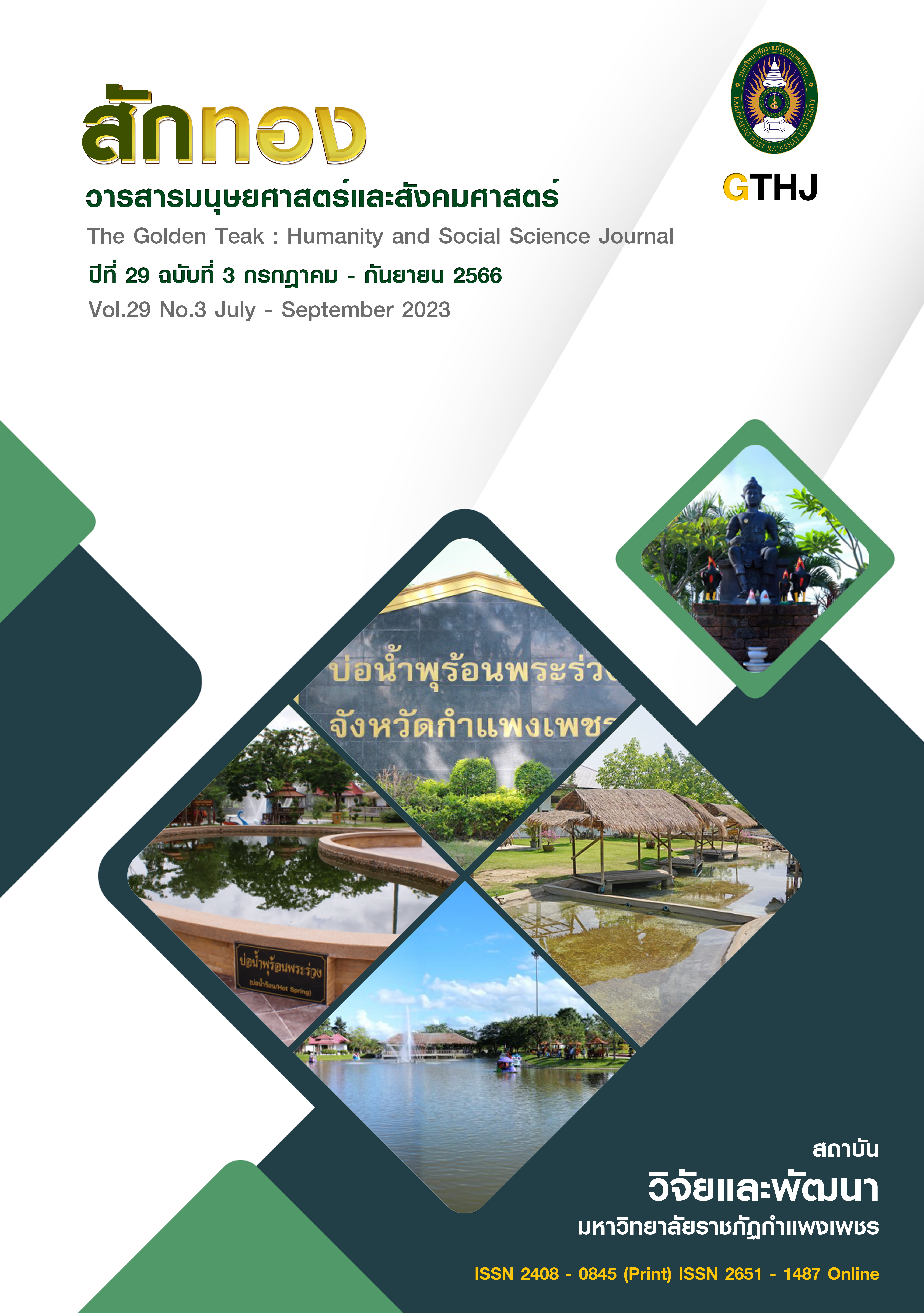The Curriculum Development to Enhance Economical Life Characters on the Sufficiency Economy Philosophy for Lower-secondary Students
Main Article Content
Abstract
The purpose of this research aims at developing the sufficiency economy philosophy curriculum for lower-secondary students. The research methodology employed four stages of the research and development: 1) studying basic information regarding the sufficiency economy philosophy to enhance the economical life of lower-secondary students, 2) developing and monitoring the curriculum 3) conducting a pilot study and studying the use of the curriculum, and 4) evaluating the curriculum. The sample were 30 lower-secondary students at Phayao University Demonstration School in the academic year 2021, obtained by using purposive sampling method from the students who voluntarily participated in learner development activities. The instruments consisted of 1) the sufficiency economy philosophy curriculum to enhance the economical life of lower-secondary students and 2) three assessment forms of on sufficiency economy philosophy to enhance the Economical life characters: modesty, reasonableness, and good immunity. The data were analyzed using average, standard deviation, and independent samples T-test. The results were as followed: 1. The sufficiency economy philosophy to enhance the economical life characters of lower-secondary students consisted of 1) modesty, 2) reasonableness, and 3) good immunity. Besides, there were pathways to developing the sufficiency economy philosophy to enhance the economical life by initiating the curriculum using active learning via a learning process designed according to the sufficiency economy philosophy and the concepts of Character Education introduced by Lickona (1992) 2. The sufficiency economy philosophy to enhance the economical life characters curriculum for lower-secondary students consisted of six components: 1) principles, objectives, 3) contents, 4) learning activities 5) learning instruments and resources, and 6) assessment and evaluation. The result of the developed curriculum was appropriate at the highest level; the result from the pilot study also revealed the possibility of manipulating the curriculum. 3. After the curriculum implementation, the result of the sufficiency economy philosophy to enhance the economical life of lower-secondary students after participating in the curriculum was at a high level (= 45.91, S.D. = 5.92). When considering through topics, the results were that the highest level was 'having good immunity' (
= 50.40, S.D. = 7.64) followed by ‘reasonableness’ (
= 45.33, S.D. = 6.69) and ‘modesty’ (
= 42.5, S.D. = 3.45), respectively. the implementation sufficiency economy philosophy to enhance the economical life characters curriculum for lower-secondary students revealed that the average scores of the pre-implementation were 129.37, while the post-implementation was 137.73. Additionally, the post-implementation scores were statistically higher than pre-implementation at the significant level of p ≤ 0.05. 4. The assessment and evaluation of the sufficiency economy philosophy to enhance the economical life characters curriculum for lower-secondary students discovered that students' opinions on the learning activities after the course implementation were at the highest level (
= 4.70, S.D. = 0.39).
Article Details

This work is licensed under a Creative Commons Attribution-NonCommercial-NoDerivatives 4.0 International License.
บทความที่ได้รับการตีพิมพ์เป็นลิขสิทธิ์ของวารสาร สักทอง : วารสารมนุษยศาสตร์และสังคมศาสตร์ สถาบันวิจัยและพัฒนา มหาวิทยาลับราชภัฏกำแพงเพชร
ข้อคิดเห็นใดๆ ที่ปรากฎในวารสารเป็นวรรณกรรมของผู้เขียนโดยเฉพาะ ซึ่งมหาวิทยาลัยราชภัฏกำแพงเพชรและบรรณาธิการไม่จำเป็นต้องเห็นด้วย
References
Beauchamp, George A. (1981). Curriculum Theory. (4 th ed.). Illionis : F.E.Peacock.
Bloom, Benjamin S., David R. Krathwohl & Masia (1973). Taxonomy of educational objectives : The classification of educational goals, by a committee of college and university examiners. Handbook 1 : Cognitive domain. New York, Longmans.
Buason, R. (2008). Research and development of educational innovations. Bangkok : modern words. [In Thai]
Buasri, T. (1999). Design and Development Course Theory. (2 nd ed.). Bangkok : Thanat. [In Thai]
Kaewurai, W. (2006). Curriculum development and teaching. Phitsanulok : Education Naresuan University. [In Thai]
Kaewurai, W., Wattanatorn, A., Kiatmaneerat, K., Suwanasri, N. & Thammasit, P. (2011, September–December). Development of a learning management model according to the philosophy of sufficiency economy in the teacher profession Northern University Group. Journal of Graduate Studies, Nakhon Sawan Rajabhat University, 6(17), 13-29. [In Thai]
Khamanee, T. (2016). Deciphering the philosophy of Sufficiency Economy to teach thought processes. (3 rd ed.). Bangkok : Chulalongkorn University Press. [In Thai]
Kohlberg, Lawrence. (1969). The Psychology of Moral Development Volume II. SanFrancisco: Harper & Row.
Lickona, T. (1992). Educating for character: How our school can teach respect and responsibility. NY : Bantam Book.
Lunsakawong, C. (2015). A constriction of the sufficient life instruments align to the basic education core curriculum B.E.2551 (A.D. 2008) for lower secondary students. Master Thesis, M.A., Burapha University, Chonburi. [In Thai]
Office of the Basic Education Commission. (2008). Basic Education Core Curriculum B.E. 2551 (A.D. 2008). Bangkok : Ministry of Education. [In Thai]
Office of the Education Council. (2017). National Education Plan 2017-2036. Bangkok : Office of the Education Council [In Thai]
Phojai, N. (2017). A development of curriculum based on lickona’s character education approach to enhance responsibility of lower-secondary education students. Doctoral dissertation Thesis, Ph.D., Naresuan University, Phitsanulok. [In Thai]
Sufficiency Economy Driving Subcommittee. (2007). Compilation of the royal speeches of His Majesty King Bhumibol Adulyadej From the year 1950-2006 related to the philosophy of economy. (5 th ed.). Bangkok : Office of the National Economic and Social Development Board. [In Thai]
Taba, Hilda. (1962). Curriculum Development : Theory and Practice. New York : Harcourt, Brace & World.
Tyler, Ralph. (1949). Basic Principles of Curriculum and Instruction. Chicago : University of Chicago Press.
Utranan, S. (1989). Fundamentals and principles of curriculum development. Bangkok : Education Chulalongkorn University. [In Thai]
Wongyai, W. (1995). Develop new curriculum and teaching. Bangkok : Rungruengtham Printing House. [In Thai]


